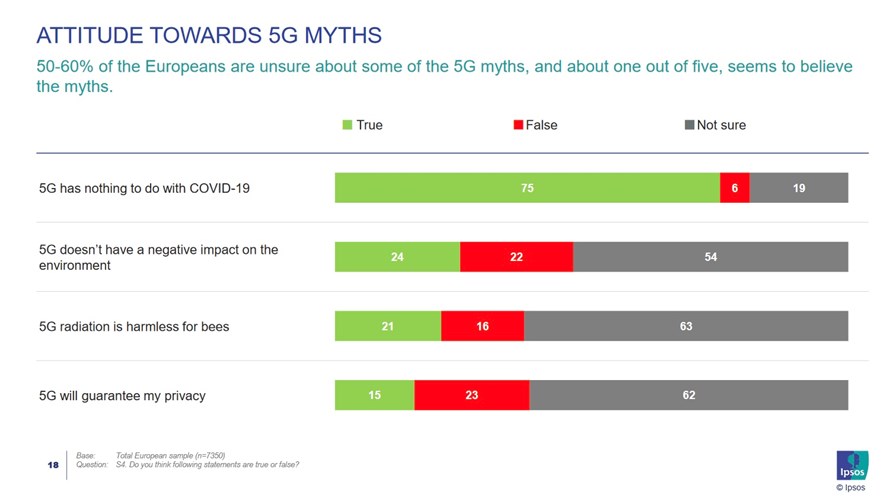
- Europeans want better information on 5G, survey shows
- Consumers learn about technology from social media, but don't trust it
- Just 61% believe 5G important in daily life
- Most people not sure if it affects bees
While telecoms operators are rolling out 5G networks liked greased lightnin’, or are at least giving that impression, consumers in Europe want more. Information, that is. And they believe telcos and governments are the organizations that should be providing it.
As many as 40% of European citizens are not satisfied with the communication they are receiving from their government on 5G, according to a new pan-European 5G sentiment survey carried out by IPSOS for telecoms association ETNO (European Telecommunications Network Operators' Association).
For the most part, the results of the survey are positive for the telecoms industry, with the majority of respondents aware of the technology and, to a certain extent, of the benefits it could bring. But at a time in which misinformation can spread quickly – the trend for burning 5G masts seems to have abated, thankfully, but there are still plenty of conspiracy theorists out there – the industry needs to keep an eye on the 5G message. For example, 75% of survey respondents believe there is no link between Covid-19 and 5G (that is still uncomfortably low), but only 21% accept that 5G radiation is not harmful to bees; 16% think the technology is damaging to our apian chums, while a sizeable 63% answered "not sure." (See chart above.)
The fact that one in three survey respondents – 7,000 of them, across 23 European markets and a variety of age brackets – get their information about 5G from social media perhaps goes some way to explain why misinformation persists. However, respondents also noted that they don't particularly trust social media channels or advertising, which should redress the balance somewhat. They do, however, trust technology websites (rightly so), telecoms companies and governments, in that order.
But the most trusted sources are not providing enough information. Just 8% of respondents learned about 5G from government sources, while north of 40% declared themselves dissatisfied with government communications on 5G. Meanwhile, only 21% relied on communications from the telcos to learn about 5G.
Thus, ETNO surmises, both governments and telecoms operators need to speak up more.
"This survey shows that Europeans are eagerly waiting for 5G. However, results also ring the alarm bell on disinformation and show a clear demand for trusted information," said ETNO Director General Lise Fuhr, in a statement accompanying the survey results. "As we move to speed up roll-out, it's important for public authorities to step up their support," she said.
ETNO published the results of the survey, carried out in August, after the European Commission last month called on member states to create a toolbox of best practices with a view to reducing the cost and increasing the speed of 5G network rollouts across the bloc. With 5G availability accelerating, it makes sense that people need access to reliable information about the technology.
As it stands, the mood in Europe is relatively upbeat on 5G, but for many consumers there is a big question mark over whether they actually want or need it. More than two-thirds of survey respondents recognised that 5G will be faster than 4G, while almost half identified higher capacity as an advantage over the previous technology generation. But much smaller numbers indicated awareness of the contribution of 5G in areas like driverless cars, VR and AR, and remote healthcare.
Furthermore, between 85% and 87% believe 5G will be important for businesses and in innovation, but only 61% identified it as important for daily life.
5G! You're the one that I want... maybe... if the government tells me more about it.
- Mary ‘Rizzo’ Lennighan, for TelecomTV
Email Newsletters
Sign up to receive TelecomTV's top news and videos, plus exclusive subscriber-only content direct to your inbox.




